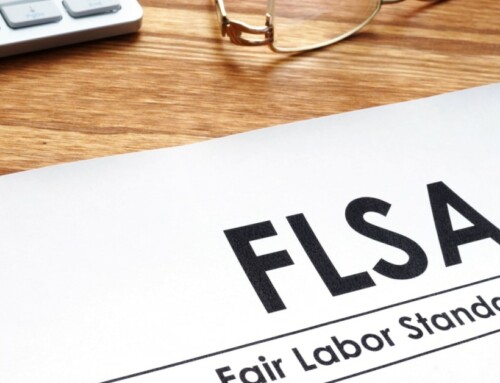While South Carolina is working hard to move past the COVID-19 crisis, employers in the state continue to face litigation risks related to the pandemic. As employers decide about vaccination requirements, whether to provide paid leave for vaccination appointments, and which employees will continue working remotely, they must keep all pertinent legal requirements in mind. Here is an overview of some of the issues that have the potential to lead to COVID-19-related litigation for employers in South Carolina:
Paid Leave Requests Under the Families First Coronavirus Response Act (FFCRA)
The Families First Coronavirus Response Act (FFCRA) was enacted in 2020 to respond to the Covid-19 outbreak by providing paid leave for employees impacted by the virus. While the mandate to provide paid leave has expired, employees may still file claims for alleged violations committed in 2020.
Employers face three main litigation risks under the FFCRA: (i) failure to inform employees of their rights under the FFCRA, (ii) failure to respect employees’ rights under the FFCRA, and (iii) improper termination of employees who sought paid leave under the statute. These present risks not only for single-plaintiff litigation but potentially for collective or representative actions as well.
Claims of Improper Termination Related to COVID-19
In addition to unlawful termination under the FFCRA, employers can face various other claims of improper termination related to COVID-19 as well. One example would be an employee claiming retaliatory discharge after complaining of exposure risks in the workplace. Employees may also allege improper termination or constructive termination based on an employer’s failure to provide reasonable accommodations for COVID-19-related needs. In wrongful termination cases, documentation of a valid justification for an employee’s termination or the refusal to provide a requested accommodation can be crucial for avoiding liability.
Claims Related to Vaccination Requirements and Accommodations
Regardless of the policies employers adopt regarding COVID-19 vaccination, there is a high likelihood that at least some employees will be dissatisfied, which could very well lead to litigation. Generally speaking, employers can require their employees to get vaccinated against COVID-19, subject to certain exceptions. If an employer chooses to adopt a policy that requires vaccination, it must be careful to ensure that its policy accounts for these exceptions (and otherwise complies with all pertinent state and federal laws). Employers should also note that a bill was filed in the South Carolina legislature that would prohibit most employers from requiring employees to receive the COVID-19 vaccine. As of the posting of this article, that bill had passed the Senate and was referred to committee in the House.
Employers in South Carolina may face litigation risks from COVID-19 vaccination requirements (or lack thereof) including:
- Allegations of failure to allow exceptions to mandatory vaccination policies in violation of Title VII and/or other anti-discrimination laws;
- Allegations of failure to adequately protect employees by requiring COVID-19 vaccination or otherwise implementing safeguards in the workplace;
- Allegations of wrongful termination of employees who refuse to comply with the company’s COVID-19 vaccination policy; and,
- Allegations of failure to provide reasonable accommodations to employees who cannot get vaccinated violate the Americans with Disabilities Act (ADA).
Claims Related to Workplace Safety Under OSHA
The U.S. Occupational Safety and Health Administration (OSHA) has adopted workplace safety guidance specific to the COVID-19 pandemic but has not yet issued regulations specific to COVID-19. The South Carolina Department of Labor, Licensing & Regulation (DLLR) has adopted an OSHA-approved State Plan that applies to most private-sector employers. Employers that fail to comply with all pertinent workplace safety requirements can expect to face litigation if these failures lead to actual or potential COVID-19 exposure.
Claims Involving Alleged Pay Violations
Another risk facing employers is the risk of employee lawsuits alleging pay violations. For example, Walmart is currently facing possible class action litigation involving allegations that it failed to pay its employees for time spent obtaining COVID-19 screenings. As summarized on Law.com, “The workers assert that Walmart asks them to arrive 30 minutes before their shift and stand in line for a temperature and coronavirus symptom check, but does not pay them for the 10 to 15 minutes that the process usually takes.” Other employers could potentially face similar claims as well, and there is a possibility that similar lawsuits could arise out of employers’ mandatory vaccination requirements.
Workers’ Compensation Claims Related to COVID-19
While a bill seeking to provide special workers’ compensation protections for first responders, healthcare workers, and corrections officers in South Carolina failed to pass, all eligible employees can potentially file workers’ compensation claims if they contract COVID-19 on the job (and the South Carolina Workers’ Compensation Commission established special codes for pandemic-related claims). If employers deny coverage to employees who allege that they contracted the novel coronavirus at work, this could lead to litigation before the Workers’ Compensation Commission—and eventually in court.
Challenges to Employee Non-Competition Covenants
Another area in which the pandemic has the potential to bring novel litigation is restrictive covenants. Many of these clauses contain geographic descriptions of areas in which an employee cannot go to work for a competing employer. But with more employees working at home, and many expected to continue to work remotely at least part of the week even as the pandemic subsides, how will these clauses be enforced? If a former employee goes to work for a business located well outside the geographic restriction, but works remotely at a location within the restricted area, will that violate the covenant? These are questions that are likely to keep courts busy as employers and employees adjust to changes brought by the pandemic.
Speak with a South Carolina Employment Lawyer at Gignilliat, Savitz & Bettis, LLP
Gignilliat, Savitz & Bettis, LLP is a South Carolina employment law firm with Columbia offices that exclusively represents employers. If your company is facing COVID-19-related litigation, or if you have questions about what your company can do to mitigate its risk of litigation, please call 803-799-9311 or contact our employment lawyers online to arrange a confidential consultation.






